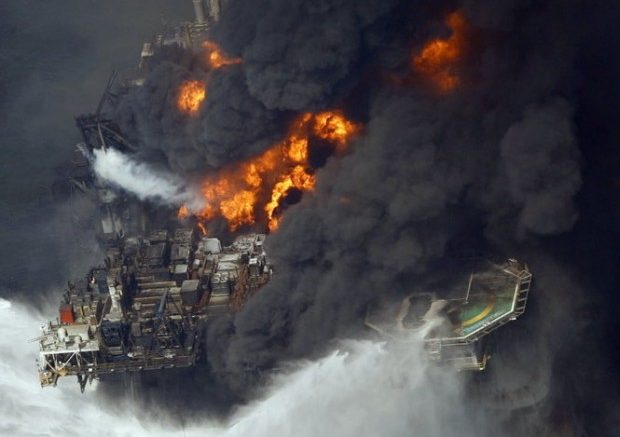A federal judge has ordered that attorneys representing private individuals and companies who entered into economic and medical claims settlements with BP stemming from the Deepwater Horizon disaster are entitled to be paid $555.2 million to cover their legal fees and remaining court costs.
The award equals about 4.3 percent of the estimated $13 billion that BP is expected to pay under the ongoing settlements, significantly lower than the average 9.92 percent of awards paid as fees and court costs in 21 similar “super-mega-fund” settlements totaling more than $1 billion, said U.S. District Judge Carl Barbier in an order issued Tuesday (Oct. 25).
In weighing the award against local billing rates, Barbier said it would be the equivalent to an average $450 per hour legal fee, after being weighted for the intensity of effort involved in the case. That compares to average nationwide rates of $604 for partners and $370 for associates in 2014, and to the $600 per hour paid by the state of Louisiana to its attorney in the BP case, Barbier said.
Barbier’s order does not say how the money will be split among the attorneys. That will be determined at a later date. The order also doesn’t say how many attorneys are to split the award. However, the motion requesting the award lists more than 90 attorneys as either members of the Plaintiff Steering Committee or as “common benefit attorneys” working on the settlements.
The fee and costs money is not being deducted from claims. Rather, as part of the economic and medical settlements, BP agreed to set aside up to $600 million for plaintiff legal fees and expenses.
Barbier has already awarded $37.6 million of BP’s $600 million in shared expenses to attorneys and other service providers, and another $7.2 million in what is called “held expenses,” that will be determined later by a court-appointed accountant and fee committee.
The plaintiff attorneys also have requested $124.9 million in fees and expenses that Halliburton and Transocean already agreed to pay as part of separate settlements totaling $1.9 billion over those two companies’ involvement in the BP accident and spill. Barbier said that request would be considered as part of the final approval of those settlements. A hearing on the settlement is scheduled for Nov. 10.
In explaining the reasons for the high amount of the fee award in the BP cases, Barbier cited the five-year timeline of the complex legal battle that led to the private claims settlement, and the two federal court trials over liability issues and public claims, which the attorneys also participated in.
“Petitioning attorneys have performed an immense amount of work in this MDL (Multi-District Litigation),” Barbier said in his order. “Counsel expended over 527,000 hours on common benefit work. Counsel took hundreds of depositions and analyzed over 90 million pages of documents.
“Furthermore, they did something that rarely happens in class actions: they went to trial,” he said. “Counsel engaged in a massive, two-phase trial effort in pursuit of the claims assigned to the class by BP and expressly reserved claims of individual members.”
“Both settlements provided significant and beneficial grants to help the entire region rebound economically from the spill and to help build infrastructure for the better delivery of healthcare to affected communities,” Barbier added, pointing to money set aside for community healthcare programs and for a program supporting seafood marketing, as well as the establishment of an online library of oil spill research.
He said that not only did the time and effort mean attorneys working on the case couldn’t work on other cases, “it required many common benefit attorneys to move to New Orleans and devote their entire practice to this MDL for years. These lawyers spent days and weeks away from their homes and family.”
The result of their work, he said, was full compensation for the losses — plus punitive damages and a factor for future risks — for 101,000 individuals and businesses representing 133,000 economic claims; and payments for specified physical conditions for almost 13,000 medical claimants as of July 1.
Barbier pointed out that soon after the April 20, 2010, Macondo well blowout, the class action attorneys “started to coordinate with one another and to take actions, not only for the protection of their own individual clients, but with a eye towards the advancement and protection of the common and colllective interests of others who were likely to become litigants at some point in time.”
The team of attorneys, led by New Orleans attorneys Steve Herman and Jim Roy, who were appointed co-liason counsel by Barbier in August 2010, created a documentary depository/”war room”, arranged for internet services and hired fulltime personnel to handle the complex case.
In October 2010, Barbier created a plaintiffs steering committee to oversee the private claims prosecution, which set up 45 different work groups to handle administration; legal research; written discovery; science, environmental and damages issues; deposition and trial preparations; punitive damages; insurance issues; and issues involving the short-lived, BP-created Gulf Coast Claims Facility.
Those teams had to tackle a variety of issues involving “vessel of opportunity, oyster, real property and other claims.
At its height, the depository took up an entire floor in an office building near the U.S. District Courthouse, with its 15,500 square fet including conference rooms, individual offices and more than 70 computer work stations staffed on a full time basis, Barbier said.
The team created a “short form joinder” that sped the process of filing claims, which was used by about 130,000 individuals, businesses and local government entities.
In advance of the two court trials, the team produced more than 90 million pages of documents, which involved more than 70 document reviewers and analyists. The team of attorneys also collected and indexed more than 10,000 scientific and legal articles used during the trial.
The team also scheduled and conducted more than 400 depositions, “reaching a climax in the summer of 2011, with seven depositions conducted, on two continents, in one day,” Barbier said.
Barbier pointed out that while the Gulf Coast Claims Facility was handling claims, before the settlement, he had agreed to allow part of the claims issued by the facilities to be held back to pay part of the attorneys’ costs. But those hold-backs were later released, meaning no fees were deducted from claims.
Barbier dismissed objections to the awarding of fees and costs by four members of the class action class, who contended that the attorneys didn’t convince BP to increase the amount of money it had already agreed to pay claimants.
Barbier said the class action attorneys had shown that the Gulf Coast Claims Facility had already paid out 92 percent of the money that the company believed should have been awarded to claimants, and the settlements actually increased that amount significantly.
He also said he had “serious doubts” whether those objecting to the fees and costs had standing to object, since the award does not reduce the amount any claimant will receive under the settlement, “and the court long ago found that the settlements were fair, reasonable and adequate to the classes.”
Source: www.nola.com





Be the first to comment on "Class-Action Attorneys Awarded $555.2 Million for Work in BP Lawsuits"